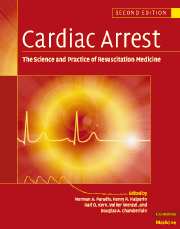Book contents
- Frontmatter
- Contents
- List of contributors
- Foreword
- Preface
- Part I Introduction
- Part II Basic science
- Part III The pathophysiology of global ischemia and reperfusion
- Part IV Therapy of sudden death
- 23 Prevention of sudden cardiac death
- 24 Sequence of therapies during resuscitation: application of CPR
- 25 Transthoracic defibrillation
- 26 Automated external defibrillators
- 27 Public access defibrillation
- 28 The physiology of ventilation during cardiac arrest and other low blood flow states
- 29 Airway techniques and airway devices
- 30 Manual cardiopulmonary resuscitation techniques
- 31 Mechanical devices for cardiopulmonary resuscitation
- 32 Invasive reperfusion techniques
- 33 Routes of drug administration
- 34 Adrenergic agonists
- 35 Vasopressin and other non-adrenergic vasopressors
- 36 Antiarrhythmic therapy during cardiac arrest and resuscitation
- 37 Acid–base considerations and buffer therapy
- 38 Cardiac arrest resuscitation monitoring
- 39 Special considerations in the therapy of non-fibrillatory cardiac arrest
- 40 Cardiocerebral resuscitation: a new approach to out-of-hospital cardiac arrest
- 41 Thrombolysis during resuscitation from cardiac arrest
- 42 Percutaneous coronary intervention (PCI) after successful reestablishment of spontaneous circulation and during cardiopulmonary resuscitation
- 43 Emergency medical services systems and out-of-hospital cardiac arrest
- 44 In-hospital resuscitation
- 45 Complications of CPR
- 46 Bringing it all together: state-of-the-art therapy for cardiac arrest
- Part V Postresuscitation disease and its care
- Part VI Special resuscitation circumstances
- Part VII Special issues in resuscitation
- Index
43 - Emergency medical services systems and out-of-hospital cardiac arrest
from Part IV - Therapy of sudden death
Published online by Cambridge University Press: 06 January 2010
- Frontmatter
- Contents
- List of contributors
- Foreword
- Preface
- Part I Introduction
- Part II Basic science
- Part III The pathophysiology of global ischemia and reperfusion
- Part IV Therapy of sudden death
- 23 Prevention of sudden cardiac death
- 24 Sequence of therapies during resuscitation: application of CPR
- 25 Transthoracic defibrillation
- 26 Automated external defibrillators
- 27 Public access defibrillation
- 28 The physiology of ventilation during cardiac arrest and other low blood flow states
- 29 Airway techniques and airway devices
- 30 Manual cardiopulmonary resuscitation techniques
- 31 Mechanical devices for cardiopulmonary resuscitation
- 32 Invasive reperfusion techniques
- 33 Routes of drug administration
- 34 Adrenergic agonists
- 35 Vasopressin and other non-adrenergic vasopressors
- 36 Antiarrhythmic therapy during cardiac arrest and resuscitation
- 37 Acid–base considerations and buffer therapy
- 38 Cardiac arrest resuscitation monitoring
- 39 Special considerations in the therapy of non-fibrillatory cardiac arrest
- 40 Cardiocerebral resuscitation: a new approach to out-of-hospital cardiac arrest
- 41 Thrombolysis during resuscitation from cardiac arrest
- 42 Percutaneous coronary intervention (PCI) after successful reestablishment of spontaneous circulation and during cardiopulmonary resuscitation
- 43 Emergency medical services systems and out-of-hospital cardiac arrest
- 44 In-hospital resuscitation
- 45 Complications of CPR
- 46 Bringing it all together: state-of-the-art therapy for cardiac arrest
- Part V Postresuscitation disease and its care
- Part VI Special resuscitation circumstances
- Part VII Special issues in resuscitation
- Index
Summary
Introduction
Emergency Medical Services (EMS) constitute a unique component of health care in the prehospital setting. Prehospital EMS systems are commonly understood as the resources used for planning and providing medical care for patients who experience an unpredicted need for emergency or urgent medical care outside a hospital. The EMS system 's primary role is to provide care for patients whose lives are at immediate or imminent risk. In the beginning of organized prehospital care, most emergencies were of traumatic origin but in the last decades this has changed to include medical problems. In 2002 at the conference of the European Resuscitation Council in Florence the First Hour Quintet (FHQ) was defined, a set of five major medical problems of prehospital care on which EMS can have a significant impact on the outcome; these are:
out-of-hospital cardiac arrest (OHCA)
severe respiratory difficulties
severe trauma
chest pain, including acute coronary syndrome
stroke.
Together these conditions areamongthe four leading causes of death in the European Union (EU). Cardiovascular problems, cancer, externalcauses,andrespiratorydiseases represent the top four leading causes of death and morbidity: 80% of all deaths are attributable to these common causes. Cardiovascular disease (CVD) is the number one cause of death in all EU countries, resulting in 4 million deaths per year inEuropeor 1.5 million in theEU,respectively.CVDalso accounts for the largest amount of years of life lost by early death in Europe and in the European Union, contributing significantly to the escalating costs of health care. Coronary HeartDisease (CHD) is the most important cause of death in the adult population, comprising 55% of all CVD deaths.
- Type
- Chapter
- Information
- Cardiac ArrestThe Science and Practice of Resuscitation Medicine, pp. 772 - 781Publisher: Cambridge University PressPrint publication year: 2007
- 1
- Cited by



